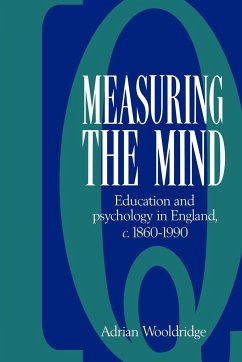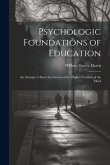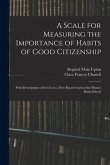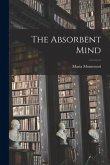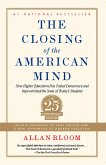This book describes the history of educational psychology from 1860 to 1990, focusing on a group of psychologists who dominated educational policy-making.
The central claim of Measuring the Mind is that, contrary to popular opinion, the psychologists who dominated educational policy-making between the wars were educational progressives and political radicals. They argued that education should reflect the requirements of children rather than the convenience of adults, and regarded intelligence testing as an instrument of child-centred education. These psychologists owed their political inspiration to the meritocratic ideal and lost popularity with the waning of this ideal after the war. Four main themes dominate the discussion: the emergence of educational psychology as a distinct discipline; the recent history of ideas about children's mental development; the role of experts in formulating educational policy; and the rise and fall of the measurement of merit.
Review quote:
'- a gem of a book - has the mark of real intellectual distinction -'. Nature
Table of contents:
Acknowledgements; 1. Introduction; 2. Studying childhood; 3. The invention of educational psychology; 4. Cyril Burt and the psychology of individual differences; 5. Susan Isaacs and the psychology of child development; 6. The structure and status of a profession; 7. Mental measurement and the meritocratic ideal; 8. The psychometric perspective; 9. Psychologists as policy-makers, 1924-1944; 10. The measurement of merit anatomised; 11. Equality and community versus merit; 12. Egalitarianism triumphant; 13. Cyril Burt and the politics of an academic reputation; 14. Equality and human nature; 15. The measurement of merit revived; 16. Conclusion; Glossary; Selective bibliography; Index.
Hinweis: Dieser Artikel kann nur an eine deutsche Lieferadresse ausgeliefert werden.
The central claim of Measuring the Mind is that, contrary to popular opinion, the psychologists who dominated educational policy-making between the wars were educational progressives and political radicals. They argued that education should reflect the requirements of children rather than the convenience of adults, and regarded intelligence testing as an instrument of child-centred education. These psychologists owed their political inspiration to the meritocratic ideal and lost popularity with the waning of this ideal after the war. Four main themes dominate the discussion: the emergence of educational psychology as a distinct discipline; the recent history of ideas about children's mental development; the role of experts in formulating educational policy; and the rise and fall of the measurement of merit.
Review quote:
'- a gem of a book - has the mark of real intellectual distinction -'. Nature
Table of contents:
Acknowledgements; 1. Introduction; 2. Studying childhood; 3. The invention of educational psychology; 4. Cyril Burt and the psychology of individual differences; 5. Susan Isaacs and the psychology of child development; 6. The structure and status of a profession; 7. Mental measurement and the meritocratic ideal; 8. The psychometric perspective; 9. Psychologists as policy-makers, 1924-1944; 10. The measurement of merit anatomised; 11. Equality and community versus merit; 12. Egalitarianism triumphant; 13. Cyril Burt and the politics of an academic reputation; 14. Equality and human nature; 15. The measurement of merit revived; 16. Conclusion; Glossary; Selective bibliography; Index.
Hinweis: Dieser Artikel kann nur an eine deutsche Lieferadresse ausgeliefert werden.

